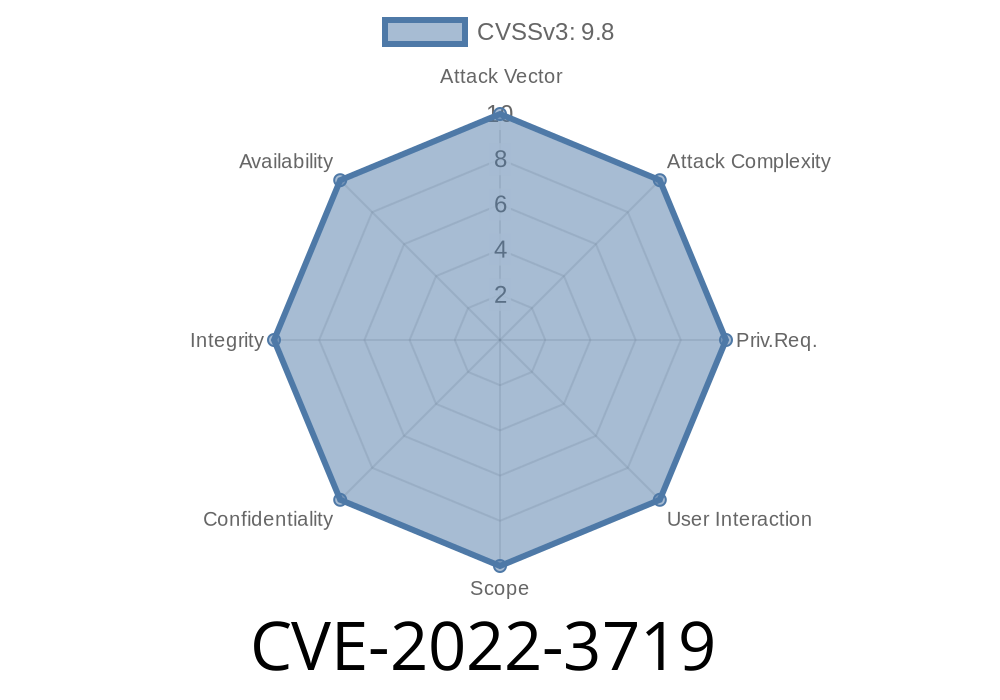In today’s increasingly digital world, the security of the software handling your media files is more important than ever. This post breaks down CVE-2022-3719, a major vulnerability found in Exiv2—a toolkit widely used for reading, writing, and manipulating image metadata. This exclusive, in-depth look will help you understand the risk, see how the exploit works, and learn how to protect your systems.
What Is Exiv2?
Exiv2 is an open-source C++ library and command-line tool to manage image metadata such as EXIF, IPTC, and XMP. It is integrated into many desktop and server applications for photo management, making its security especially critical.
The Vulnerability at a Glance
- CVE ID: CVE-2022-3719
Exploitability: Remote (by sending a crafted file)
- Patch: Commit a38e124076138e529774d5ec989d0731058115a
- VulDB ID: VDB-212350
How Does the Vulnerability Work?
The vulnerability exists in how Exiv2 handles QuickTime video files. Inside the source file quicktimevideo.cpp, the function QuickTimeVideo::userDataDecoder() fails to properly validate data lengths before copying memory. By supplying a specially tailored (malicious) QuickTime file, an attacker can trigger this code path and cause the program to write past the end of a memory buffer on the heap.
This opens the door to classic heap-based buffer overflow attacks, where the attacker may achieve remote code execution or crash the application.
Example: The Faulty Code
Below is a simplified code snippet similar to the vulnerable pattern. (Not actual source, but representative.)
void QuickTimeVideo::userDataDecoder(const uint8_t* data, size_t length) {
char buffer[256];
// No length checking!
memcpy(buffer, data, length); // POTENTIAL VULNERABILITY!
// ... further processing ...
}
What’s wrong?
If length exceeds 256, memcpy will write past the end of buffer, potentially overwriting adjacent heap memory. If the attacker can control data and length, they now have a way in.
Proof of Concept Exploit
An attacker can exploit this simply by crafting a QuickTime-like file with a malicious user data section. Suppose you feed this file to any app/server that processes it with a vulnerable Exiv2 version—it may result in a crash or let the attacker inject code.
Minimal POC
# Let's pretend malicious.mov is a crafted input
exiv2 -p a malicious.mov
If your exiv2 version is vulnerable, this could crash the tool or worse.
*Note: For legal and ethical reasons, we do not provide working exploit files.*
Patch & Mitigation
The developers fixed this bug in commit a38e124076138e529774d5ec989d0731058115a.
Here’s what the secure code might look like
void QuickTimeVideo::userDataDecoder(const uint8_t* data, size_t length) {
char buffer[256];
if (length > sizeof(buffer)) {
// Length is invalid, prevent the overflow
throw std::runtime_error("userDataDecoder: input too large");
}
memcpy(buffer, data, length);
// ... further processing ...
}
Recommendation:
Upgrade Exiv2 to the latest version available here, or apply the patch commit directly if you maintain your own fork.
Further Reading & Sources
- CVE-2022-3719 at NIST
- VulDB Entry: VDB-212350
- Official Patch Commit
- Exiv2 Project
Conclusion
CVE-2022-3719 is a critical, remotely exploitable bug affecting countless applications using Exiv2. Don’t wait until it’s too late—review your software, update to the latest Exiv2, and stay cautious with untrusted media files.
Timeline
Published on: 10/27/2022 11:15:00 UTC
Last modified on: 10/28/2022 19:45:00 UTC
